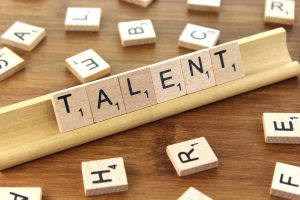
Part 1: Do I have the talent to be a Musician?
by Jessica Pollack

So many students wonder, should I major in music? Should I try against odds to make a career in music? Will I be happy and successful following what I currently think is my dream. Will I have a job that makes me happy? I can’t answer those questions. There are innumerable factors from resources to desire to the economy that will affect those answers. The question I can answer is, “Do I have the talent?” And the short answer is, Yes.
There is a certain underlying fear among students that they will not be good enough to master their instruments because of some aspect inherent to them. But instruments, like any other skill you can think of, are learnable. Whatever your ability now, there is evidence that you, as a human with a brain, have an astounding potential to learn. And knowing how to take advantage of that potential is the real secret. The people who succeed are people who have taken advantage of the incredible capacity of our brain to adapt and change and who used the learning process more effectively than most people. But we all have the power to do that.
This series has 2 posts: 1) Explain why I know you have the potential to learn and succeed 2) Explain the learning process and why I know you can use it.
Here’s what we know about how the average 95% of humans learn and how we all have to potential to master a skill.
- Intelligence and ability are not fixed
“Intelligence,” something many of us seem to conceptualize as a stable representation of ourselves, is changeable, and our abilities on our instruments (and in basically everything else) are similarly capable of growth.
The famous IQ test Alfred Binet helped create was actually designed to measure how effective curriculum was and which students needed special attention, not how intelligent a person is, and certainly not how intelligent a student could be. Binet wanted to determine what kind of changes needed to be made to teaching so that all students could learn–because he knew that all of them could.
Your ability is not fixed because our world is generally made of learnable skills. And we know you can learn because the human brain is a beautifully adaptive gift that we all have. We start off incredibly helpless compared to other newborn animals, and one reason for that is because our brains are set up slightly different. Our brains are relatively blank and undeveloped but come ready to form knowledge and learn. We can develop skills like driving, which probably don’t have much basis in evolution because rather than being hard-wired with ready-made skills, we have systems ready to adapt to whatever we teach our brain.
You can change your ability at anything because you can change your brain on a neurological level through learning. And studies show those changes through synapses in our brains as well as more visible results of students succeeding. There are studies and stories of students of all backgrounds learning across all kinds of topics when given the right conditions (access to the learning process), and you have the same raw materials as they do.
- Your current ability has NO bearing on your potential to improve or succeed.
In a study on Chess Grandmasters, there was no correlation between starting ability and grandmaster status. Some grandmasters showed “aptitude,” or “talent” right away, and some were quite bad at chess when they first played. But there was no relationship between their “natural talent” or starting ability and whether or not they reached the pinnacle of being a Grandmaster (the highest level). Some students had good instincts about how to strategize and which moves to make, and some had no way of thinking ahead and conceptualizing a plan. But all of the steps to developing good strategy are learnable. And, compared to grandmaster level, all the beginners were far from skilled.
Similarly, some students feel musical early. Some have a good sense of pitch or a good sound or faster technique. Some feel that no matter how hard they work they are always behind those who seem to succeed effortlessly. And that certainly may be true as a beginner, or even as an intermediate player. People can have different aptitudes, starting abilities, or natural tendencies that seem give them a small head start. It can make us feel like no matter how hard we try, that person will always be a few steps ahead of us because they started there. But studies like this one show us that improving doesn’t work that way in the long run.
They show us that starting ability has no bearing on future success and those early differences don’t have to be life changing or defining. By the time we are looking for music jobs, any differences based on natural “talent” will be erased through productive practice. Let me say that again. Differences in starting ability do NOT predict expert performance later. The message is not that less “talented” people might be able to catch up if they fight against the odds. The message is that the odds are exactly the same no matter your initial talent level. This is the case because we ALL use learning to excel in our chosen field. Which brings me to my next point.
- There is no such thing as talent

At least not how we normally conceptualize it. As I mentioned above there are certainly differences in starting ability, but mostly they are superficial, and they do not translate to real differences in potential.
We think of the story of the tortoise and the hare as an example that hard work can overcome natural ability. But that story is not really that accurate. It doesn’t reflect the relatively small differences in starting abilities or potential as I’ve seen it nor does it reflect the improvement a “tortoise” can make through learning. It says that a tortoise will always be a tortoise, and implies that his success depends on the failure or laziness of the hare. But that is not how learning works.
There is no one with a natural ability so far ahead of anyone else that it is like comparing a turtle to a rabbit in a race. There is growing evidence that even those considered prodigies are just people who learned very efficiently (often with help and resources of the right conditions) at a young age. They usually have resources such musical parents who teach them, money, time, an unusually focused interest, etc. But the important thing these prodigies seem to have that others don’t is successful use of the learning process–not some innate musical ability with which we can never compete. The good news, then, is that we can use that same process to succeed as well.
Think of the best, most naturally gifted musicians you know. They are as much of a tortoise as you are. Maybe they happened to blow through their horn in a way that was more helpful than your first guess. Maybe they have a better sense of pitch. Maybe they already know about music theory or history. Whatever the difference is, it is nothing that you cannot learn. And once you do, the starting difference in your ability will disappear. This matches the story the chess studies tell us. It does not matter how good you are now, it only matters that you are willing to learn and to practice correctly (and a lot).
The types of things people become experts at (like music performance) are almost laughably complex. They take a huge amount of time and effort to begin to grasp the many moving parts that go into them. Talent could never take you all the way through that process on its own. In fact, for many professionals, attributing their success to talent shows a lack of respect for the amount of hard work they put forth for years and decades. The great thing about this, though, is that you can do it too. Each of those moving parts can be broken down and learned until you are ready to do them all together. (we will talk about the learning process in the next post)
What about nurture vs. nature?
Yes, there are definitely differences in nature, genes, etc. And we are not born the same or with the same resources. But, evidence continually supports the idea that well-executed continual practice, rather than “natural” ability, is the determining factor in future ability. Moreover, there is no evidence that people have ever stopped learning because they reached some innate limit in their capacity to improve–in fact there is no evidence that such a limit even exists for us as humans. That’s crazy! As Dr. Ericsson explains, people stop learning because they stop practicing correctly. Again, it seems the skills we learn are so complex and that our capacity to learn is so great that starting ability does not make a difference.
- Your belief in whether you can succeed is hugely important.
For a few reasons. First, there is evidence that belief is important if not required for growth and change. It is difficult to succeed if you think you can’t. And the journey to mastering your instrument is long–it will last your whole musical life. Doubting your ability has been shown to negatively affect your motivation to work through the challenges every day.
But even more than that those fairly obvious effects, your belief (or lack thereof) in your inherent ability to learn affects you in a lot of unconscious ways. In “Mindset,” Dr. Carol Dweck tells us that people can have a “fixed” or “growth” mindset about their abilities. Growth mindset people believe you can continually learn if you work hard and evaluate flaws appropriately. Fixed mindset people think that while you may have to work a little to develop some abilities, your general ability level (or talent) is set for life in any particular area. You either are intelligent or you aren’t. You are musical or you aren’t. You are mathematically inclined or you aren’t. You are a hare or you are a tortoise. What you do with that has consequences, but you cannot change what you are. That mindset is dangerous, unproductive, and, because it does not reflect what we know about learning, basically incorrect. But if you believe it, you can define yourself and your worth this way. One major way that inhibits learning is it makes you afraid to put forth effort. And effort is absolutely necessary to improve.
- Effort is not a sign of inability
Have you ever been in a rehearsal where you or someone else brags about not having to practice a particular difficult passage–or even a whole piece? I heard that many times in high school. The message people convey with that is they are so good they didn’t have to practice. Conversely, if you had to practice you are not as good as they are. But practicing is not a sign of weakness or inability.
You have to put forth effort to learn new and more difficult things, and you have to learn new and more difficult things in order to improve. Usually, you won’t get them right the first time, and that doesn’t matter. Trying different methods of succeeding until you find the right one is not failing, it’s learning. And as Dr. Dweck tells us, any child with a new puzzle or game will tell you that.
So why do we grown-ups think effort is bad? Let’s go back to the story of the tortoise and the hare. As Dweck explains in “Mindset,” fixed mindset people take from this metaphor that a person is either a tortoise or a hare, and if you have to put forth effort, you must be a tortoise. And no matter how hard or long you work, you cannot stop being a tortoise. So you better be a hare if you want to succeed. And if hare is naturally (read effortlessly) fast, you have to succeed without putting forth too much effort. This is a little ridiculous (and a lot dangerous) because effort is crucial to the learning process (obvious, right?) Practicing is just a part of life for anyone trying to improve in any field and it is the only way to do so.
Conclusion: You DO have the potential to master your instrument
The goal for this article is for you to stop worrying about whether or not YOU are enough. Because you are. Never mind the fact that you are a human being and you are valuable as an individual life (that is already, hopefully, a given). You are enough as a musician because you have the natural ability to learn. And that natural ability is the only one that matters. All worrying about whether you can be a good musician will do is distract you from learning and improving, and likely make you miserable. If you stop worrying about proving you have what it takes, it, first of all, removes a huge amount of stress (from personal experience), and secondly opens you up to actually learning.
I don’t know if you will get a job as a musician, and I don’t know if that job can make you happy. But I can tell you the science of learning is overwhelmingly positive and optimistic in that it continually points to the idea that we all have the potential to grow and learn incredible skills. And if you want to, you can accomplish incredible things with your instrument.
These posts are based primarily on studies and findings from “Mindset,” by Dr. Carol Dweck and “Peak,” by Dr. Anders Ericsson. They are compiled and adapted to be relevant to young musicians based on my experience as a student, performer, and teacher. I encourage anyone interested in or helped by these points to go to their original source and to continue learning from psychology after this introduction just as we learn from our music instructors. Any source that talks about sports or performance psychology, or educational psychology can also point you in the right direction. Another favorite of mine is the bulletproof musician blog: http://www.bulletproofmusician.com/about/ If you have any questions or comments feel free to reach out at [email protected] or check out what else I’m learning about at http://www.jessicapollackclarinet.com/
Comments are closed.